“God is spirit, and those who worship him must worship in spirit and truth,” Jesus tells the Samaritan woman at the well in John 4:24. But when our worship is based in a denial of truth and runs counter to the nature and character of God is it truly worship? This is a question I have been pondering in considering a series of worship events organized by Sean Feucht, a vocal supporter of President Donald Trump, worship leader, and politician.
Following the murder of George Floyd, the Minneapolis community created a memorial at the intersection where a police officer knelt on Floyd’s neck. Some local churches set up stages and began what they described as a revival that attracted evangelists from across the country, including Feucht. “My heart really began to burn for Minneapolis when I saw what was happening, and I had some friends reach out and say, ‘Hey man would you be willing to come? We saw what happened in St. Louis,’” said Feucht in a video he posted on Instagram.
The next time I heard about Feucht, he was in Portland, Ore., a city that has been protesting continually since Floyd’s murder. Feucht organized a prayer and worship event called Riots to Revival. Hundreds of people, mostly white, gathered without masks despite a state restriction banning gatherings larger than 50 people to prevent the spread of COVID-19.
“We just believe that the church has the ability to change the narrative,” Feucht told Fox News after the Portland event. “All of America has just seen these buildings burning, and they’ve seen this destruction and this violence, and the mainstream media seems to be infatuated with this. But what I’m telling you is that there’s another story of what God is doing in these cities and the church is rising up.”
Downplaying a pandemic
Since then, Feucht has held additional worship events as part of his “Let Us Worship” tour, including stops in Seattle, Dallas; Atlanta; Charleston, S.C., Kansas City, Mo., and Nashville, Tenn., The tour culminates this Sunday, Oct. 25, in Washington, D.C.
But as a Black woman and seminarian, I question whether what is happening at these events is actually worship. To me, they seem more like political demonstrations that deny the truth of COVID-19, ignore the reality of racism in the United States, and run counter to the revolutionary spirit of Jesus.
More than two hundred thousand people in the United States have died from COVID-19; people of color have been disproportionately impacted. Yet the gatherings Feucht has hosted have repeatedly denied this reality by holding large events in defiance of public health guidelines where few attendees wear masks. Earlier this month, Feucht tweeted out the survival rates of COVID-19 and then told his followers to “…take a deep breath. Calm down and worship on.” Downplaying a pandemic is not living out the gospel message to love and care for one’s neighbors.
A key goal of Feucht’s gatherings is protesting the COVID-19 precautions that have resulted in the physical closure of churches. “Politicians can write press releases, they can make up threats, they can shut down parks, they can put up fences,” he told Christianity Today after his event in Seattle. “But they can’t stop the church of Christ from worshipping the one true God. We are here as citizens of America and of the kingdom of God and we will not be silenced.” Attendees at Feucht’s events echoed the sentiment: “They’re trying to shut down churches and in California, they’ve even banned singing (in churches),” said one attendee in the same article.
It is important to note that videos related to these events are connected directly with Feucht’s new movement, Hold the Line, which encourages the church and millennials to become more politically active. “It is time for patriots across the nation to engage and restore America,” says a pledge on its website. “Governmental overreach to control our liberties families and the values we hold dear has gone too far.” In a July interview with Good Day LA Feucht said: “You see the governor and a lot of state officials encouraging the protests, and I’m not against those either, but in the same breath, you have them banning the ability for the church to come together in [groups of] less than 100 and simply sing. And so, it seems very hypocritical at best and maybe even discriminatory at worst and so we wanted to kind of take action against that.”
Delegitimizing protests
Sean Feucht often presents his worship events in contrast to the protests against police violence toward Black people. In an article published in The Federalist, a conservative online publication, Feucht wrote: “While followers of Jesus are being told we cannot worship in public spaces, violent paid rioters are taking over our streets and being given license to occupy and destroy entire sections of our cities. Churches are being covered in graffiti and even burned while civic leaders call for defunding the police.”
Meanwhile, in a Facebook post, Feucht described his event in Portland as a place where he saw people “gather blocks from violent streets without fear and sing their hearts out. They saw genuine racial reconciliation. They saw hundreds get radically saved and set free. They watched hundreds run down to the river to get baptized. Just like the Jesus People movement days. They witnessed God show up in a place so many have written off.”
The Black Lives Matter protesters are characterized as violent, destructive, and in opposition to Christianity, while Feucht claims his own events result in “genuine racial reconciliation,” a term often associated with white evangelical movements. This delegitimizes and de-centers the organizers and activists within the movement for Black lives — and suggests that Feucht does not see God moving in and through the protests for racial justice.
These events work to further a white supremacist evangelical theology, which emphasizes individualism, claims a monopoly on morality, and demonizes those who oppose it. White supremacist evangelical theology is concerned with maintaining white power and privilege and the status quo, a cause that has been integrated into Trump's platform. In December 2019, Feucht and other worship leaders were invited to hold a worship service inside the White House. “When the President of the United States invites you inside the White House to worship and pray, YOU DO IT. @realDonaldTrump expressed the need for prayer over America and wisdom for this administration and we were honored and humbled to respond,” tweeted Feucht.
Despite this presidential invitation to worship, this twisted theology also leads to claims of persecution. Its adherents believe they are persecuted for being true to their moral values in a world that promotes “sin”—and this sin includes alternate interpretations of the Bible that call for liberation, inclusion, and social justice. “Truly, the actions of militant, anti-Christian forces, who want to shut down our churches, silence our worship, and even shoot our fellow believers in the streets, have stirred the soul of the American church,” wrote Feucht in his piece for The Federalist. “Where we have stood in solidarity with Christians around the world whose hostile governments threaten their religious freedom, we now stand with each other on our native soil.”
Similarly in an October Facebook post, Feucht wrote, “‘Religious persecution in America does not exist, Sean. Stop all this stuff!’ Moscow, Idaho: ‘If you worship Jesus outside, we will arrest you.’ Me: Who wants to come to #LetUsWorship in Idaho with me?” After delegitimizing racial justice protesters, Feucht re-centers himself and like-minded believers as the real victims of injustice .
Feucht’s “Riots to Revivals” and “Let Us Worship” events fail to live up to the mission of the revolutionary Jesus. Not the blonde-haired, blue-eyed, apolitical, passive Jesus, but the Jesus of the Bible who started a riot in the Temple. In the gospel of Luke, Jesus makes it clear that he came for those who had been harmed by the institutions and systems of his day — the Roman empire — when he says, “The Spirit of the Lord is upon me, because he has anointed me to proclaim good news to the poor. He has sent me to proclaim liberty to the captives and recovering of sight to the blind, to set at liberty those who are oppressed, to proclaim the year of the Lord’s favor.” It is for this reason that Jesus was killed by the state as a political threat. To worship in “spirit and truth” is to commit to living like this revolutionary Jesus who preached that loving God meant loving one’s neighbor and caring for “the least of these.”
Got something to say about what you're reading? We value your feedback!






